Guest article by Cohen of the PC Gaming Guru
In recent years, tabletop gaming has experienced a bit of a renaissance – or, at the very least, a surge in popularity. This is partially due to web shows like Critical Role bringing the beauty of tabletop gaming into the public sphere.
There’s no longer a major stigma against sitting down with your friends to talk in funny voices and roll loads of dice for hours on end. Tabletop RPG players are no longer geeks who live in our mother’s basement… Well, for the most part, anyway.
Funnily enough, that’s exactly how I felt about D&D players prior to trying it for myself – as someone who plays primarily video games (mostly single player RPGs like the Witcher 3), it always seemed like a strange hobby to me.
But I’m getting off topic. The point is, I’ve since changed my mind, and come to absolutely love all things tabletop gaming!
With games like Dungeons & Dragons (And various other systems) becoming more and more popular, it’s only natural that in today’s fast-moving culture people would begin looking for alternative ways to play. After all, finding a group in real life can be hard, if not impossible in certain parts of the country. Seriously, if you live in a rural area, are you really going to drive 2 hours out of your way to play D&D every week? Probably not.
Enter virtual tabletops – online platforms that seek to emulate the experience of sitting around a table roleplaying it up with friends. While there are plenty of ways to play tabletop RPGs online, two of the most popular (at the moment) are Roll20 and Fantasy Grounds – both vastly different platforms that offer vastly different experiences.
Being that I’m actually playing in a fairly long-running virtual campaign right now (7 months now), I’ve experienced both of these platforms pretty extensively. Our group first started out with Roll20, and then migrated to Fantasy Grounds after a few months.
But that’s enough background. Let’s get to the meat and potatoes of this post – the comparison itself!
I’ll be covering each platform individually, going over several key points such as the cost (if any) and a few of my personal thoughts on both platforms. But first, a quick description of both platforms.
What Is Fantasy Grounds?

Fantasy Grounds is a virtual tabletop with a lot of extra features and content that set it apart from Roll20. Whereas Roll20 focuses on simplicity and functionality, Fantasy Grounds offers ridiculous amounts of customization, a beautiful interface, and plenty of optional supplements and rule books that can be purchased. However, it has its pros and cons, like any other platform – but more on that later.
I would say that Fantasy Grounds seeks to immerse its players more fully in their gaming experience.
Once you get used to the interface, accessing various menus is a breeze – your character sheet, party notes, and even magic items can all be organized into handy windows – not to mention the fact that your entire interface can be customized based on what you’re doing. For instance, when creating a new character, you simply hit the “Create PC” button which then switches all of your sidebar buttons over to ones that are more appropriate for creating a new character (Refine this paragraph once you’ve gotten into FG)
What Is Roll20?

Roll20 is another virtual tabletop, but it lacks the sophistication of Fantasy Grounds. Instead, it focuses on being as user-friendly and straightforward as possible. It also tries to be a one-stop shop for all things D&D-related.
Tiles, tokens, etc. can all be purchased from Roll20’s store, groups can be found using Roll20’s on-site LFG functionality, and each game can have its own mini-forum for players to create topics and discuss things (Should they choose to do so).
The Comparison
Pricing – Winner: Roll20
This was an easy win for Roll20, being that it’s totally free! Aside from buying completely optional battle maps, Roll20 doesn’t lock any of its features away behind a paywall. While this comes at the cost of a more limited interface and set of features in general, the lack of any up-front payments reduces the barrier to entry quite a bit. This makes it ideal for people who are looking for a quick, free way to jump into a game with friends online.
Fantasy Grounds is a paid platform, with both monthly and one-time pricing models available. There are 3 main tiers of Fantasy Grounds – Demo, Standard & Ultimate. I won’t go into the details about all of the pricing models here (There’s a LOT to cover), but you can read about it on the Fantasy Grounds website.
The gist of FG’s pricing, though, is that there are 3 tiers – Demo, Standard & Ultimate.
Demo players are only able to play in Ultimate-hosted games, but it’s free for them to do so.
Standard players get access to everything Ultimate players do (Tokens, battle maps, rulesets, etc.) but they can only play games with other Standard or Ultimate players – in other words, unless you shell out the extra cash for the Ultimate tier, everyone in your party is going to have to pay for a Standard membership.
Ultimate players get access to a ton of tokens, battle maps, and all major ruleset books and data libraries, but the big attraction here is that they can also host games for players of any service tier – including demo players. This means that you essentially only need one player (Probably the DM) to pay for an Ultimate membership, and the rest of the party can play in his or her games for free!
Finding A Game – Winner: Roll20
Another easy win for Roll20. Roll20 offers an on-site LFG system, where you can create your own custom profile and list some of the things you’re looking for in a game. You can filter open games by communication medium (Voice, text-only, video, video+voice), ruleset (5E, 4E, or something completely un-D&D related) and experience level (whether or not they accept newbies).
Fantasy Grounds, on the other hand, lacks this functionality entirely.
Fantasy Grounds comes in the form of a program, and it does not communicate with any major databases or servers – in other words, there is no “LFG hub” available. You will have to find players through more traditional means, such as the LFG subreddit, or various other RPG group-finding platforms. This may not necessarily be a “con” for some people (As it can be difficult to find the right group even on Roll20’s platform), but it’s worth mentioning.
The Interface – Winner: Fantasy Grounds
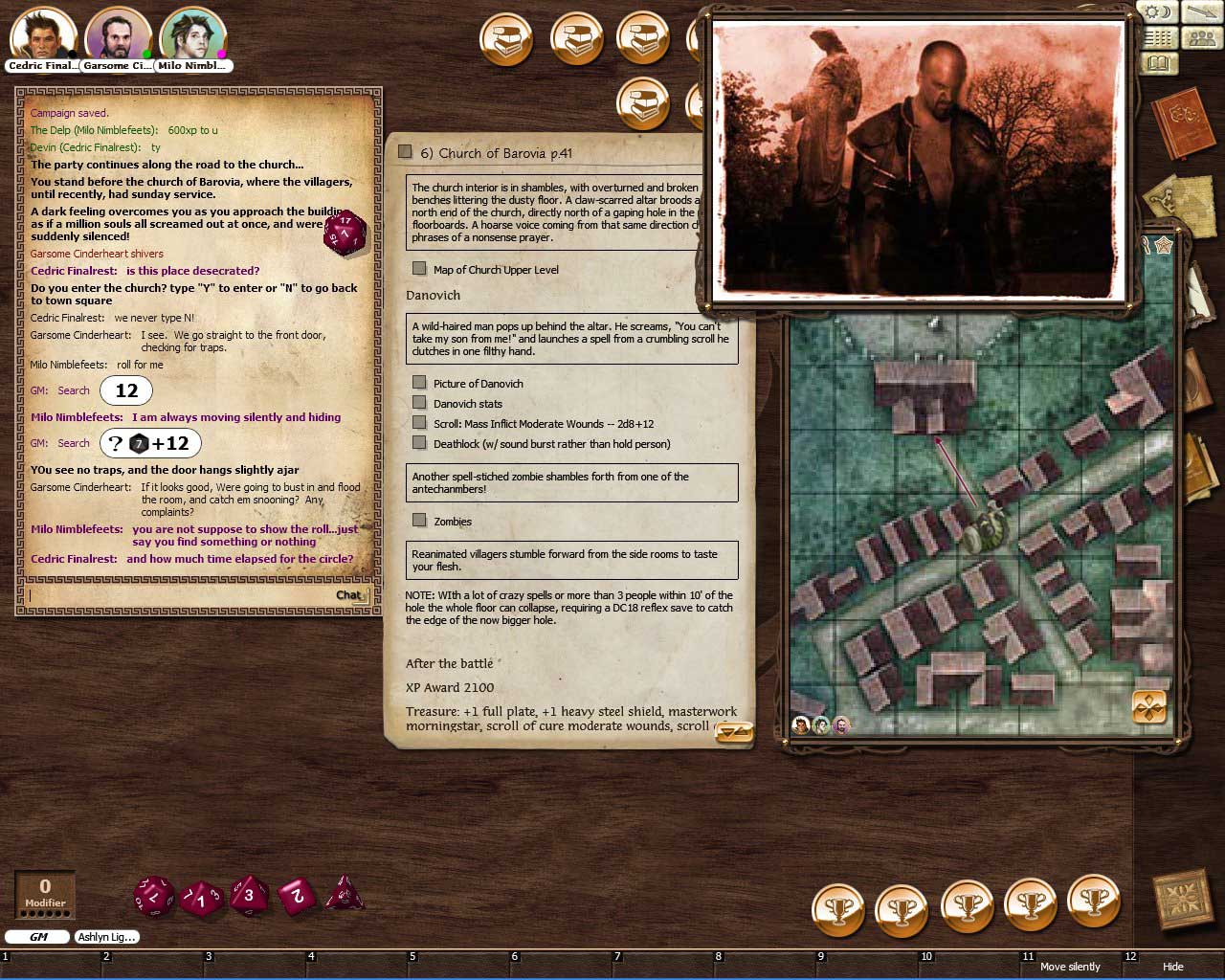
This is one area where Fantasy Grounds absolutely takes the lead. The interface is highly customizable (By the DM and the players), easy to use (Once you get over the initial learning curve), and really helps immerse you in the game.
The leathery background, parchment-like menus, dialogue boxes, and even the 3D dice (Which can be tossed around your virtual table at will) all serve to make Fantasy Grounds a real joy to use. All in all, Fantasy Grounds offers a more complete and hands-on interface.
Fantasy Grounds allows you to drag gear, spells, weapons and various other things directly from their in-program rulesets and books to your character sheet, where it automatically calculates the effects of everything for you (Including weight and encumbrance). Being able to drag a new spell directly from Fantasy Ground’s spell list to my character sheet, and then instantly use it (If I so choose), is amazing.
Now, on to Roll20.
Roll20’s interface is by no means bad, but it is limited. While you can create character sheets and access basic rules (Such as spells and spell descriptions), you’ll still need physical (Or paid digital) copies of things like the Dungeon Master’s Guide or the Player’s Handbook to play effectively. People can manage without, of course, but it might slow down the pace of the game. The fact that Fantasy Grounds handles all that for you is pretty nice.
The downside of Roll20’s interface is just how tedious it can be to set everything up. Spell descriptions and effects, armor, weapons and their functions must all be entered manually – Often requiring you to constantly flip between your Player’s Handbook or DMG outside of the game. This disconnect between playing the game and flipping through rulebooks can be quite a chore, and can really break your immersion at times.
However, as with Fantasy Grounds, you can set up battle maps, filled with custom tiles and tokens – or go the “theater of mind” route and do away with tokens and maps entirely!
Playing The Game – Winner: Fantasy Grounds
Fantasy Grounds also has the advantage here. As I’ve stated a couple times now, interacting with the Fantasy Grounds interface is an absolute pleasure – it’s as simple or as complex as you want it to be, and the 3D dice are way better than Roll20’s.
The DM can download a whole host of user-created plugins (From the forums) that can change the look and feel of the game, while also adding more features and options for players and DMs alike. Plugins can add mood lighting (Warm screen tint for campfires, or a hazy green for bogs or swamps), in-game calendars with important events marked down and even in-game music (Without needing third-party software!). Not bad!
Beyond that, though, playing the game from the player’s perspective is very solid. As I stated above in the interface section, you can simply drag spells and equipment from the books to your character sheet – since the stats and values are automatically transferred for you (Though you can edit them at will for custom stuff), you just drag a little dice button into the chatbox, and voila! It calculates whether or not you hit, as well as how much damage you do. It does this by checking your rolls against the monster’s AC, and any resistances or invulnerabilities it might have.
It does this via complex, interactive battle maps and automatic turn trackers (With optional timers for more hectic encounters). The turn tracker is all about automation. It automatically removes health from an enemy (or player) when someone lands a hit, adds effects like poisoning or burning, and does a few other neat things as well.
I never thought I’d steal a quote from Bethesda’s Todd Howard in an article about Dungeons & Dragons, but, to put things simply – “It just works.”
Roll20’s gameplay flows nicely, too, but it focuses more on being very welcoming to newcomers and more streamlined in general. Unfortunately, the fact that it is so simplistic means that a lot more burden is placed on the DM. Keeping track of NPC health, gear and status effects will all remain manual processes.
As such, it’s not so much that Roll20 is lacking features – after all, all Roll20 is seeking to do is to bring the experience of playing D&D with a group of friends to the virtual world. Since manually keeping track of stuff has been the DM’s job for decades, I can’t count the lack of the automation and ease-of-use of FG against Roll20. But it’s certainly not a plus, so Fantasy Grounds wins by default here.
Final Verdict – Tied
At the end of the day, both Fantasy Grounds and Roll20 appeal to different audiences, and neither is objectively better than the other.
Roll20 offers a free platform that is easy to use. I would say Roll20 is primarily geared towards casual players or people who simply can’t afford to spend money on their tabletop gaming (Which is perfectly understandable, especially when you consider the cost of dice and books). The major drawback of Roll20 is that all of the complicated aspects of the game remain complicated for the DM.
Fantasy Grounds is geared more towards intermediate groups or just people who want to take the game a little more seriously in general. The fact that it automates so many processes leaves more room for the actual playing of the game – RPing, strategizing in combat, and interacting with the world the DM has created. The drawback of Fantasy Grounds is the price, and that the learning curve is a bit high, to begin with (though you get used to it after a couple sessions).
The best thing to do is to simply give them both a shot! If you shell out $10 for one month of FG’s Ultimate membership, that’s plenty of time to get a feel for the platform and see if it’s the right fit for you and your party. And since Roll20 is free, testing it out is as easy as signing up for a free account and starting up a game!





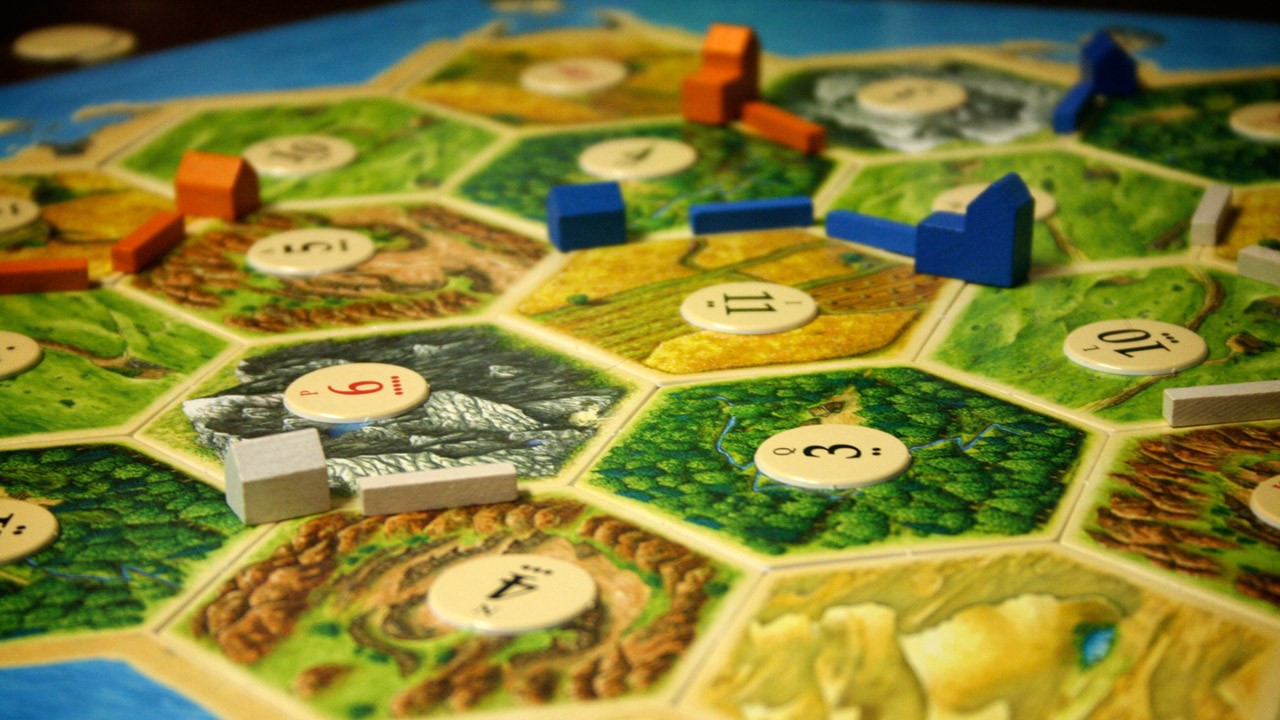
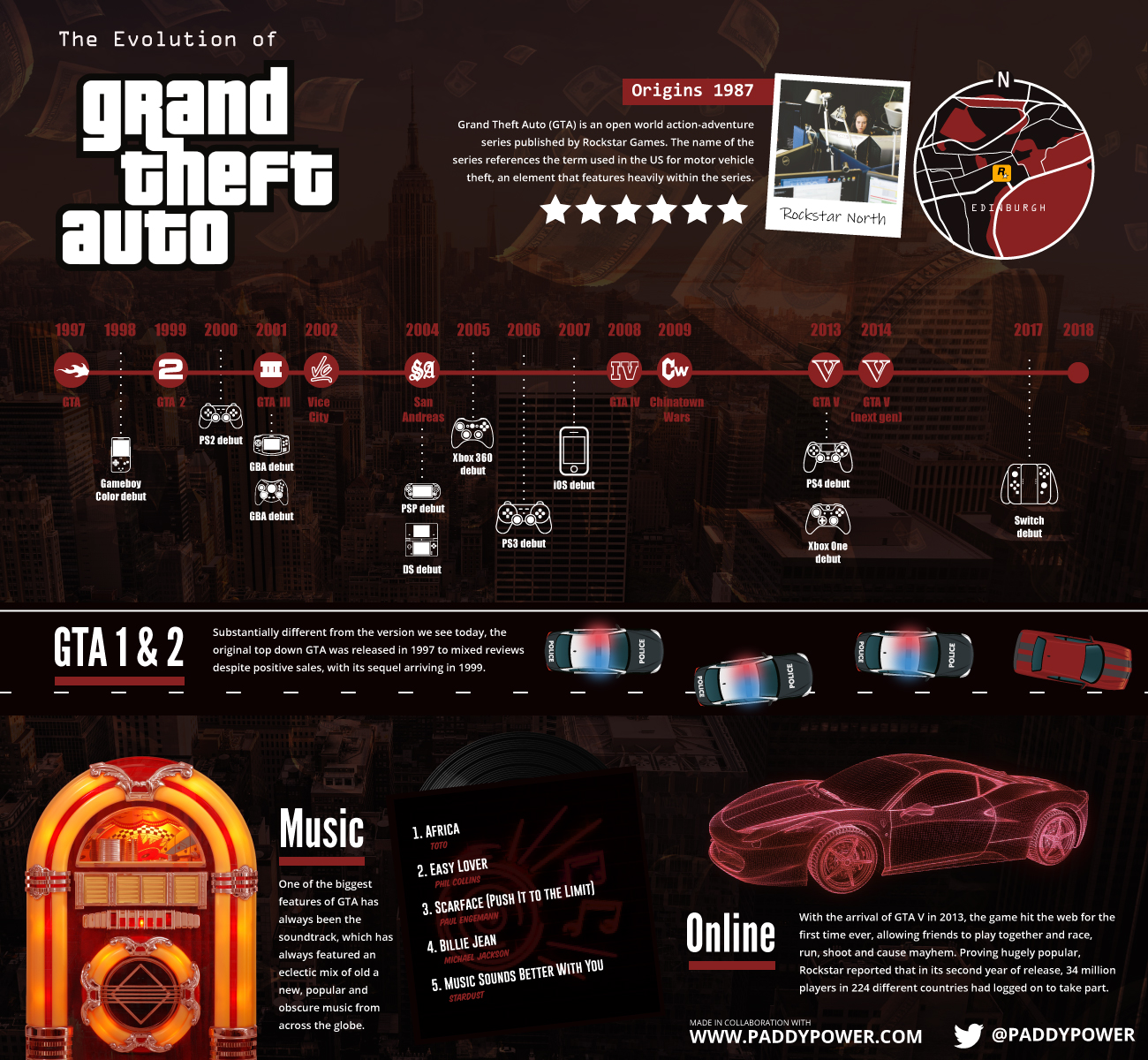













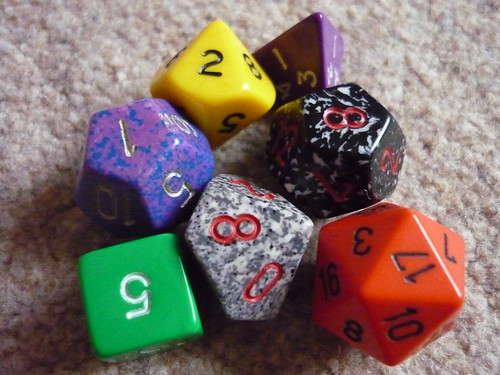

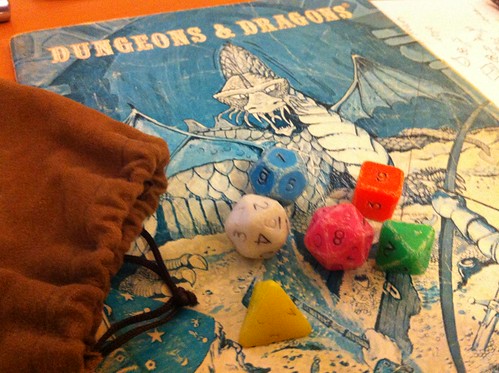
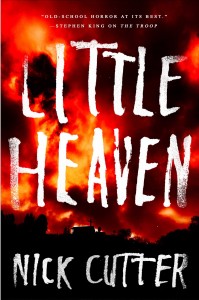
 Death Follows is unapologetically dark. Based on the title and cover art, I expected this, but it even surprised me. Having never read Mr. Bunn’s work before (this graphic novel is based upon a short story), I went into the tale not knowing what to expect. I left feeling unsettled because of it, so I’ll refrain from many spoilers here. Some will be unavoidable, however, so be warned.
Death Follows is unapologetically dark. Based on the title and cover art, I expected this, but it even surprised me. Having never read Mr. Bunn’s work before (this graphic novel is based upon a short story), I went into the tale not knowing what to expect. I left feeling unsettled because of it, so I’ll refrain from many spoilers here. Some will be unavoidable, however, so be warned.
